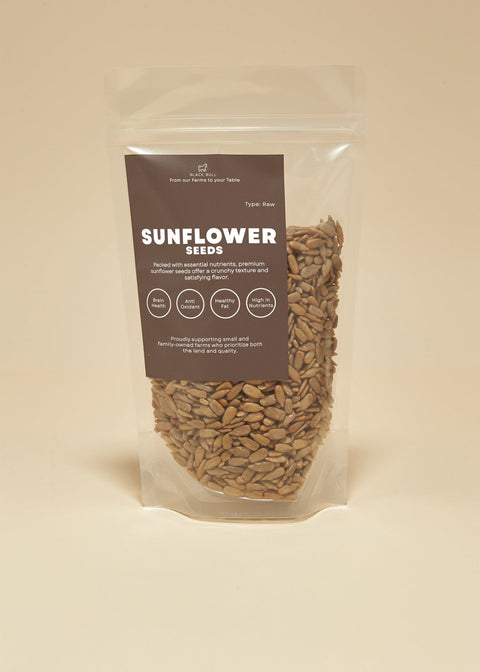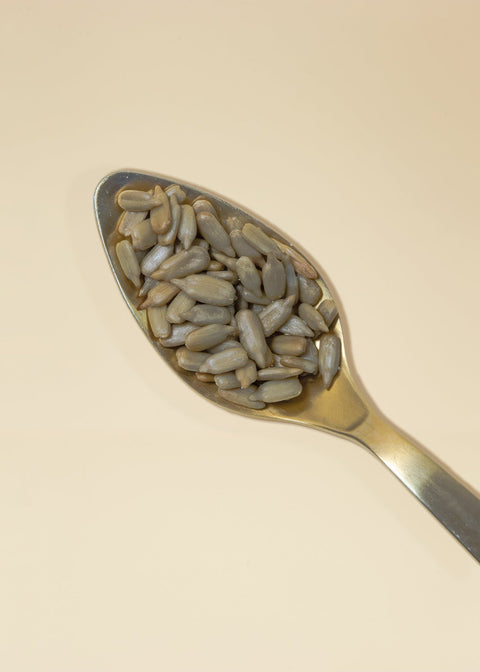

Sunflower Seeds
Sunflower seeds are packed with healthy fats, protein, and fiber. Enjoy as a snack or sprinkle over salads, yogurt, or oatmeal for added flavor. With benefits for heart health and digestion, they're a versatile addition to any diet.
Benefits
Calories, 584 kcal
Total Fat, 51.5 g
- Saturated Fat, 4.5 g
Carbohydrates, 20 g
- Sugars, 2.6 g
Fiber, 8.6 g
Protein, 20.8 g
Salt, 0.03 g
* The recommended daily serving size of Sunflower seeds for an adult is about 1 ounce (28 grams), which is approximately 1/4 cup or 4 tablespoons.
As a snack: Enjoy Sunflower Seeds as a healthy snack on their own, either raw or roasted.
Salads: Sprinkle Sunflower Seeds over salads for added crunch and nutrition.
Baking: Incorporate Sunflower Seeds into baked goods such as bread, muffins, and cookies for extra texture and nutrients.
Cooking: Add Sunflower Seeds to stir-fries, rice dishes, and casseroles for a nutty flavor and extra protein.
Yogurt and Oatmeal: Mix Sunflower Seeds into yogurt, oatmeal, or porridge for a nutritious boost.
Smoothies: Blend Sunflower Seeds into smoothies for added fiber, protein, and healthy fats.
Granola and Cereal: Include Sunflower Seeds in homemade granola or sprinkle over cereal for additional crunch and nutrition.
Trail Mix: Combine Sunflower Seeds with other nuts, seeds, and dried fruits to create a custom trail mix.
Soups: Garnish soups with Sunflower Seeds for a crunchy texture and nutty flavor.
Energy Bars: Use Sunflower Seeds as an ingredient in homemade energy bars or protein balls for added nutrition and texture.
Rich in Nutrients: Sunflower Seeds are a good source of essential nutrients such as vitamin E, magnesium, and selenium, which contribute to overall well-being.
High in Antioxidants: They contain antioxidants like vitamin E and selenium, which help protect cells from oxidative damage caused by free radicals.
Heart Health: Sunflower Seeds are rich in healthy fats, including omega-6 fatty acids, which support heart health by reducing bad cholesterol levels and lowering blood pressure.
Supports Immune Function: The zinc and selenium content in Sunflower Seeds helps support a healthy immune system and promotes wound healing.
Anti-Inflammatory Properties: The antioxidants and healthy fats in Sunflower Seeds have anti-inflammatory properties that can help reduce inflammation in the body.
Bone Health: Sunflower Seeds are a good source of magnesium and phosphorus, which are essential for maintaining strong and healthy bones.
Skin Health: The vitamin E in Sunflower Seeds helps maintain healthy skin by protecting it from oxidative damage and keeping it moisturized.
Supports Thyroid Function: The selenium in Sunflower Seeds is important for proper thyroid function and hormone production.
Weight Management: Despite being calorie-dense, the fiber and protein in Sunflower Seeds help keep you feeling full and satisfied, making them a suitable addition to a weight management diet when consumed in moderation.
Room Temperature: Store Sunflower Seeds in a cool, dry place away from direct sunlight, in an airtight container to maintain freshness.
Refrigeration: For extended freshness, especially in warmer climates, refrigerate Sunflower Seeds in an airtight container.
Freezing: Sunflower Seeds can be stored in the freezer in an airtight container for up to one year. Freezing helps maintain their flavor and freshness.


